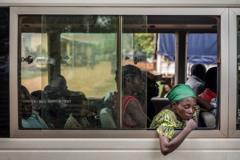In recent months, the juxtaposition of U.S. immigration policies regarding refugees has stirred significant debate, as a predetermined group of white South African refugees is welcomed while others remain in desperate need of resettlement. Pacito, a Congolese refugee currently living in Kenya, exemplifies this growing frustration. He was anticipating a U.S. resettlement flight that was abruptly canceled due to the Trump administration's suspension of the refugee program, just hours before their departure.
Pacito’s family waited alongside approximately 120,000 refugees who had completed the necessary vetting and medical screenings but are now left in limbo. The stark shift in US immigration policy under President Trump marks a departure from the more welcoming approach taken by previous administrations. In Biden's tenure, over 100,000 refugees were admitted, the highest figure in nearly thirty years.
As part of his “America first” agenda, Trump has instituted severe restrictions on refugee entry, effectively prioritizing the entry of specific groups over others. Recently, an executive order allowed for the expedited admission of Afrikaners, white South Africans claiming to be victims of persecution, resulting in a ceremonious welcome for 59 individuals at a D.C. airport. Pacito lamented, “It’s not fair,” pointing out the disparity in treatment compared to countless others who have endured immense struggles for years.
This preferential treatment arises amidst claims of “genocide” against white South Africans, a narrative popular among certain right-wing groups in the U.S. However, such assertions are widely disputed and dismissed by South Africa, where land ownership regulations geared towards equitable distribution are being mischaracterized as persecution.
Adding to the frustration, refugees like Amjad Hammad from Gaza express disbelief at the prioritization given to South African refugees over those facing dire and immediate threats. Hammad remarked on the tragic irony of being overlooked despite the ongoing humanitarian crisis in Gaza, where violence continues to escalate.
The potential for resettlement becomes increasingly bleak for many, particularly those like Pacito, who have no choice but to stay in precarious conditions in Kenya, struggling to survive from day to day. The differentiating policies continue to deepen the sense of injustice experienced by refugees around the world, leaving them grappling with uncertainty while waiting for a chance to begin anew in safety.






















